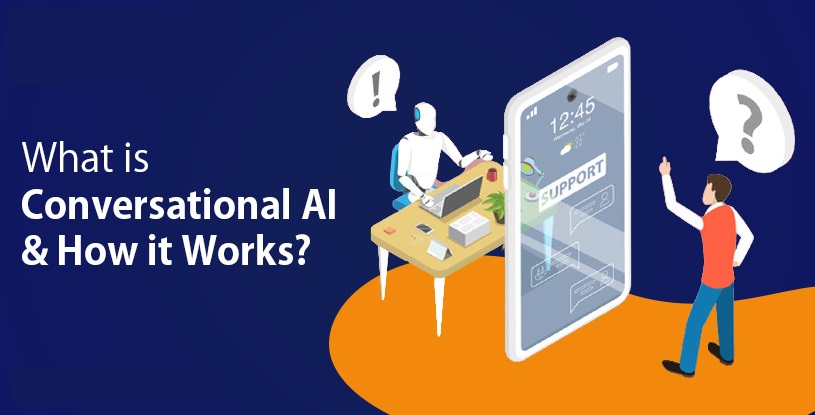How AI Enhances Business Phone Solutions

4 min read
Table of Contents
In a business environment, effective communication is more important for success. Whether it’s managing customer inquiries, handling sales calls, or providing support, having a reliable business phone solution is essential. With the advent of artificial intelligence, traditional phone systems have undergone a significant transformation, offering enhanced capabilities and efficiency.
AI-powered chatbots leverage natural language processing and machine learning algorithms to understand and respond to customer queries in real-time. When integrated with business phone solutions, chatbots can offer seamless omnichannel support, allowing customers to transition seamlessly between phone calls and messaging platforms. Chatbots can handle routine inquiries, schedule appointments, and even initiate follow-up actions, enhancing efficiency and customer satisfaction.
AI has revolutionized various aspects of business operations, and phone systems are no exception. By leveraging AI technologies, businesses can streamline communication processes, personalize interactions, and gain valuable insights from customer data.
Stay tuned for more insights on how AI is shaping the future of business communications!
Future of Business Communications
AI enhances business phone solutions in several ways, offering efficiency, personalization, and improved customer experiences. Here’s how:
Automated Call Routing
AI algorithms can intelligently route incoming calls based on various factors such as caller history, language preference, and issue type. This ensures that callers are directed to the most appropriate department or agent, reducing wait times and enhancing customer satisfaction.
Virtual Assistants
AI-powered virtual assistants can handle routine inquiries, schedule appointments, provide basic information, and even execute simple tasks such as updating contact information or placing orders.
Natural Language Processing (NLP)
NLP algorithms enable business phone systems to understand and respond to natural language queries, enhancing the conversational experience for callers. By accurately interpreting customer intent, AI can provide relevant information and solutions more effectively.
Sentiment Analysis
AI can analyze caller sentiment in real-time by monitoring factors such as tone of voice, word choice, and speech patterns. This enables businesses to identify and address issues promptly, escalate urgent matters, and ensure a positive interaction with the customer.
Call Analytics
AI-powered analytics tools can extract valuable insights from call recordings, including trends, customer preferences, and areas for improvement. By analyzing large volumes of data, businesses can make informed decisions to optimize their phone systems and enhance overall performance.
Predictive Analytics
AI algorithms can predict customer behavior and preferences based on historical data, enabling businesses to anticipate needs and personalize interactions. This helps in offering targeted promotions, upselling relevant products or services, and fostering customer loyalty.
Call Transcription and Summarization
AI can transcribe calls in real-time and summarize key points, enabling agents to focus on the conversation without the need for manual note-taking. These transcripts also serve as valuable records for training, quality assurance, and compliance purposes.
Smart Call Routing
AI can dynamically adjust call routing based on agent availability, workload, and skill level, ensuring that each caller is connected to the most suitable agent for their needs. This maximizes efficiency and minimizes wait times, leading to improved customer satisfaction.
With the advent of Artificial Intelligence (AI), businesses are finding innovative ways to enhance their phone solutions, improving efficiency, customer satisfaction, and overall productivity.
It to the integration of artificial intelligence technologies such as natural language processing, machine learning, and voice recognition into phone systems to automate tasks, personalize interactions, and optimize performance.
The integration of AI offers numerous benefits, including improved efficiency, enhanced customer experiences, and cost savings. By automating repetitive tasks and providing intelligent insights, AI empowers businesses to operate more effectively and competitively in today’s market.
AI-powered virtual assistants are becoming increasingly common in business phone systems. These intelligent agents can handle various tasks, including answering queries, scheduling appointments, and providing information, without human intervention.
Virtual assistants use natural language processing and machine learning algorithms to address user inquiries. By analyzing speech patterns and context, they can provide accurate and relevant information in real-time.
Features and Capabilities
AI-powered virtual assistants offer a range of features and capabilities, such as voice recognition, multi-language support, and integration with other business applications. These capabilities enable them to perform complex tasks efficiently and improve overall productivity.
Automated Call Routing
Automated call routing is another AI-driven feature that enhances business phone services. By intelligently routing calls based on predetermined criteria, businesses can ensure that customers are connected to the most appropriate agent or department quickly and efficiently.
CRM Integration
Integrating AI with Customer Relationship Management (CRM) systems has become a game-changer for businesses looking to streamline their phone-based customer interactions. AI algorithms can analyze customer data from CRM platforms in real-time to provide agents with valuable insights during calls. This enables agents to personalize interactions, anticipate customer needs, and offer tailored solutions effectively. Furthermore, AI-driven CRM integration automates tasks such as call logging and lead management, freeing up valuable time for sales and support teams to focus on building relationships with customers.
Efficiency Improvements
Automated call routing reduces wait times and minimizes the need for manual intervention, resulting in faster resolution times and improved customer satisfaction.
Customization Options
Businesses can customize call routing rules based on various factors, such as caller location, language preference, and past interactions, to provide personalized experiences for their customers.
IVR Phone System
Interactive Voice Response (IVR) systems have long been a staple in business phone solutions, allowing callers to interact with automated menus to access information or be routed to the appropriate department. With AI integration, IVR systems have become more intuitive and adaptive. AI algorithms analyze caller behavior and preferences to personalize IVR interactions, providing a seamless and efficient experience. Moreover, AI-powered IVR phone systems can understand natural language inputs, enabling more natural and conversational interactions with callers.
Enhancing Customer Interactions
NLP enables businesses to understand and respond to customer queries in a natural and conversational manner, improving the overall customer experience and satisfaction.
Improving Efficiency
By automating routine tasks such as call transcription, sentiment analysis, and language translation. NLP streamlines communication processes and frees up valuable time for employees to focus on more strategic tasks.
Conclusion
AI is revolutionizing business phone solutions by introducing intelligent features and automation capabilities that enhance productivity, streamline operations, and improve customer experiences. Whether it’s deploying chatbots, businesses stand to benefit significantly from leveraging AI in their phone communication strategies. By embracing it, organizations can stay ahead and deliver exceptional service to their customers.
AI has brought about a paradigm shift in business phone services by introducing intelligent features that streamline operations and improve customer experiences. Traditional phone systems often require manual intervention to route calls, leading to delays and inefficiencies. However, AI in business phone service leverages advanced algorithms to automate call routing, ensuring that customers are connected to the right department or agent quickly and efficiently.
AI is transforming business phone solutions, enabling organizations to streamline communication processes, personalize interactions, and gain valuable insights from customer data. By leveraging AI technologies such as virtual assistants, automated call routing, natural language processing, and predictive analytics. Businesses can enhance efficiency, improve customer satisfaction, and stay competitive in the market.
Published: February 27th, 2024
Subscribe to Our Latest Updates
Get monthly product and feature updates, the latest industry news, and more!








